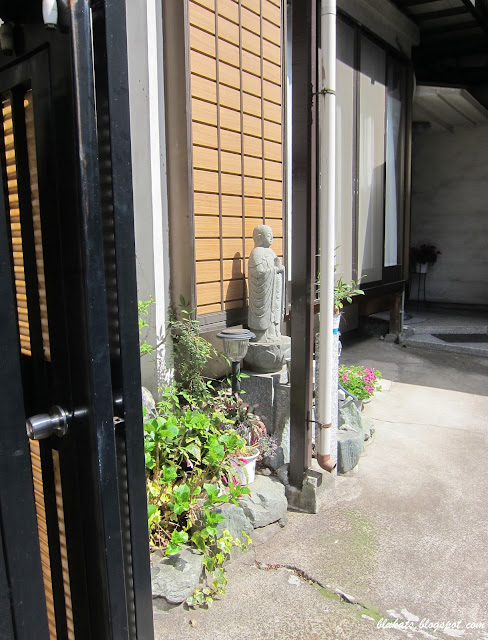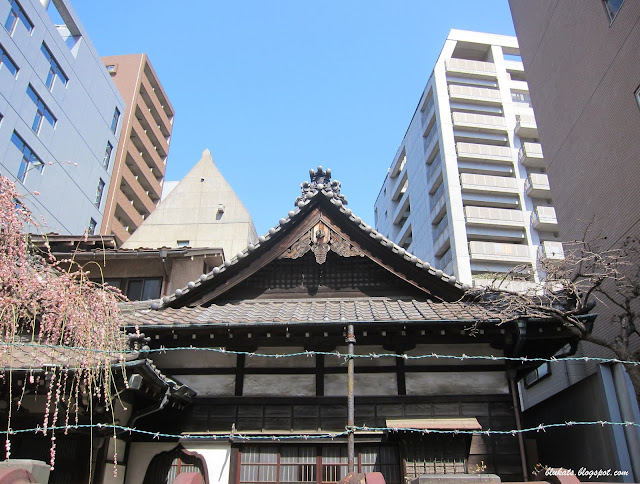If you head south from Hamamatsucho Station down one of the side streets near a corner you will be greeted by this traditional komainu.
Along with a lot of colorful banners.
Which makes it easy to find this small yet unusual and interesting shrine.
Unusual because there isn't just one gate but two.
Which lead to not one but two Inari shrines.
Along with not your traditional komainu guarding the gates.
But more modern looking lions. Just guessing but I think part of this may be due to one of the purposes of this shrine. Which is to pray for strength.
Walking inside I found an actual relative of lions.
Along with many foxes. Inari Okami's kitsune messengers.
The lanterns and kitsune surround the larger Inari shrine.
Inari Okami is well attended here.
I was unable to get a look at the interior but there is a lot going on here. Another indicator this is an Inari shrine is the rice grains seal on the offering box.
Still more kitsune including one hidden in the plants. Can you see him? Also interesting that all the flowering plants have red flowers. Red being an important color in Shintoism, used for protection.
Due to the wear on this fellow he may be one of original kitsune. I don't know if this stone gives information about the two shrines but I can write that it is presumed that the Sanuki-Kohaku shrine was founded between 1624 - 1644. It was originally part of the shimoyashiki (second residence) of the Matsudaira family of the Takamatsu clan and had to be moved in Meiji 3 when the land was paved over for the railroads. (info at this website)
Now I said there are two Inari Okami shrines here. The first is Sanuki which I'm guessing is the larger shrine because the second is Koyaki Inari Shrine and references of it mention small white foxes. Across from the larger wooden shrine is this interesting lava rock shrine complete with small torii and small white kitsune along with black and stone ones.
Koyaki Inari Shrine is opposite the larger Sanuki Inari Shrine and just behind the chōzuya. From what I have read, this is an unusual placement for the shrines. You can see the red torii on the side of the shrine. I could not find a date Koyaki Shrine was founded but it also was a part of a residence, possibly right at this location in Hamamatsucho ward. It was destroyed during WWII and rebuilt in 1965. (information from this site) I am not sure if Koyaki is also the same as Kohaku since when you search in English the shrines name includes Kohaku but in Japanese the name Koyaki is mentioned in translation for this specific shrine.
The lion relative was also enjoying the water basin. Not sure if he is also a kami or just guarding the shrines.
Along all the unusual things here are also the usual items one finds at Shinto shrines like ema prayer plaques. The majority here have kitsune foxes. Being a business area it makes sense that many come here to pray for financial success. Since providing prosperity is one of Inari Okami's main traits.
Looking from the side I could see one ema that was different, showing a bucking horse. Why in this Inari centric shrine complex? Because horses represent strength.
At the time these shrines were established the area here was known as a training ground for samurai and others. Along with learning skillful dance the practice of stone lifting, chikarashi, 力石, was done here. While I can not read most of the kanji on these, I can see it says these are strength-stones.
Along with all this is a directional stone. One could center themselves here if they wanted to. As you can see from the photo I am off-center, just a bit east of south.
One last look at these unusual shrines from under the second gate.
Which is right next to the first gate. Also unusual. It was tinted red by the many red banners.
While there are much larger shrines to visit in Tokyo, sometimes the local small shrines can be interesting and can have a lot more in them than expected. This pair definitely does.




















































